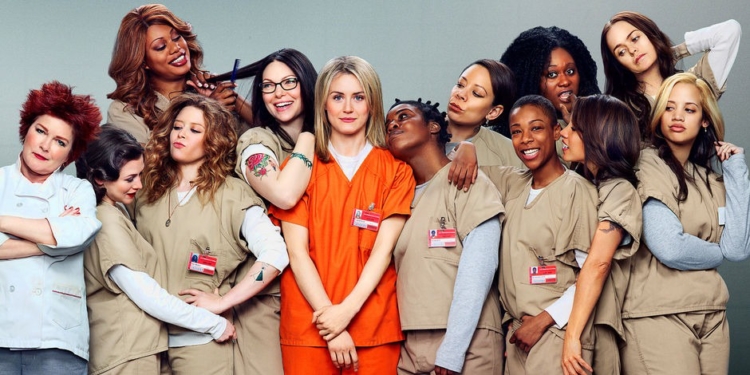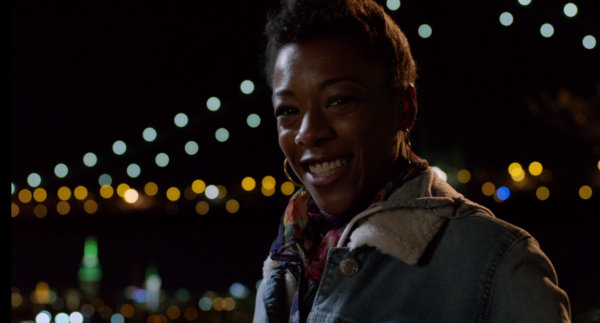Fans may have to wait until June 2017 for season 5 of Orange is the New Black, but its the perfect time to reflect on the sheer brilliance of season 4 which tackled relevant political issues such as the ‘Black Lives Matter’ movement in an intellectual, inspiring fashion.

Fans are still recovering from the nail biting season finale that SPOILER ALERT concluded with an enraged Daya (Dascha Polanco) holding a gun to officer Humphrey after a full-on riot breaks out. It followed as inmates of Litchfield dealt with the injustice and grief of the beloved Poussey Washington’s (Samira Wiley) controversial death. Fans went insane. These tragic events echoed reality with the death of Eric Garner, who was killed by US police after the officer used aggressive force pinning Garner to the ground where he was pleaded “I can’t breathe”. It is a line that is hauntingly delivered by Washington in her final moments and makes a disturbing connection to the racial issues that continue to trouble the African American communities.
The latest season dealt with some particularly heavy but very real social themes including rape, mental illness and addiction. Most notable however was its links to the ‘Black Lives Matter’ movement. The movement gained momentum all around the world after several tragic deaths occurred as a result of police brutality. The series tackled the movement in an inspiring way that we’ve yet to see by any other television series, demonstrating the unparalleled brilliance of the show.
To summarise, Litchfield became over-populated by white correctional officers on a power trip with the threat of a white supremacist movement growing within the prison walls. Sophia Bursett (Laverne Cox), a black transgender woman was taken to Maximum security for no apparent reason. To add, lesbian Poussey Washington was killed by a white correctional officer with her death being covered up by prison officials. These are the kinds of injustices that occur on a daily basis. The ‘Black Lives Matter’ movement couldn’t be more clear.
We are shown these injustices in the moments that lead up to her death as we learn that her six year sentence in Litchfield was for trespassing and selling less than half an ounce of marijuana. The ultimate injustice and indignity however, is revealed when her body is left on the floor of the cafeteria for over a day.
In the final moments of the season, we watch Poussey enjoying a night out in New York City, a moment in which she is entirely happy. It becomes a celebration of her life, something that a lot of victims of police brutality are not afforded. Then the show does something it never has before. It breaks the fourth wall and Poussey looks directly into the camera and smiles. We are confronted with a woman who reflects the ultimate humanity but has been shown the ultimate injustice. It’s utterly heartbreaking and it is impossible not to see the greater issue it represents.


The circumstances that surround her death are difficult. Fans are connected to Washington in a way they aren’t to any of the other characters. Officer Bailey is a young, compassionate correctional officer that audience members were falling for with his rich backstory. By humanising the officer, it challenged audience’s opinions on future events, showing that not everything is black-and-white. It would have been easy to demonize the guard who killed our favourite character, but that would be a dishonest treatment of a very real truth. The season isn’t about pointing the finger at one person or group, but rather about bringing to light racial issues and flaws in the prison system, citing a response for change.
At a time where the ‘Black Lives Matter’ movement was gaining such large media attention, to have Orange Is The New Black refer to these issues makes it transcend the screen and contribute to the discussion about wider social issues. The show is renowned and praised for the way it tackles such provocative social issues, by showing us what they look like, in real people, in real life. It’s a show unlike anything on television right now. It flips everything we know about television on its head. It is certainly always uncomfortable viewing but brings into dialogue these realities that we too often sweep under the rug.
As a medium, television is able to transcend its entertainment values and become a source of social change. If the next season of OITNB is anything like the last, who knows what issues will be brought up.
What do you think? How did you feel with the death of Poussey’s death? Comment below.






